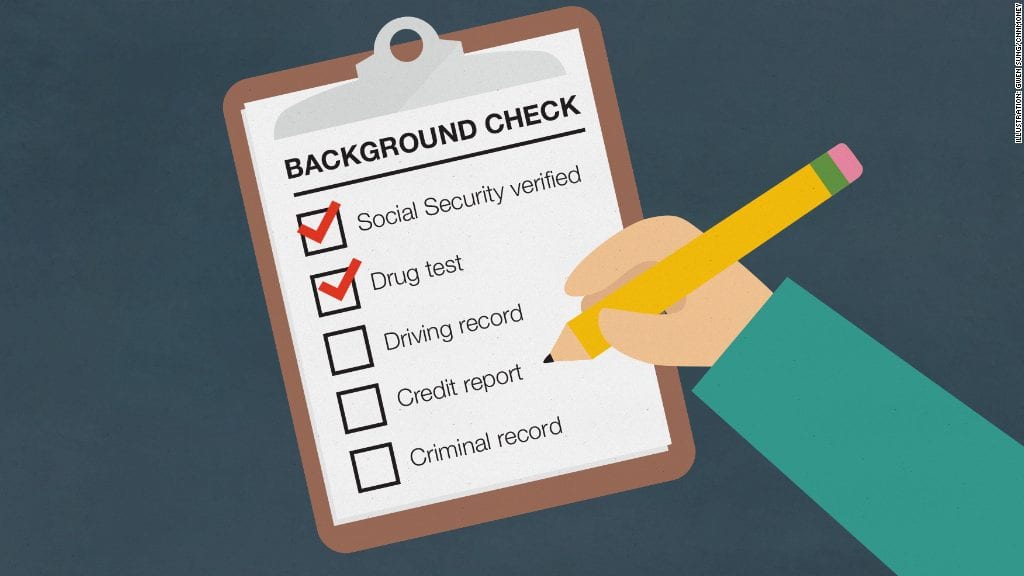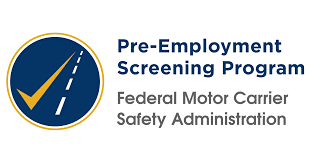Upcoming Change to Pre-Employment Investigations for Drug and Alcohol Violations
Read the latest safety bulletin detailing upcoming changes to pre-employment investigations. Make sure you are signed up for future safety bulletins! Need a PDF to download and share?
In This Issue:
- Upcoming Change to Pre-Employment Investigations for Drug and Alcohol Violations
- Driver Background Investigations
Upcoming Change to Pre-Employment Investigations for Drug and Alcohol Violations
Beginning January 6, 2023, a pre-employment Clearinghouse query will satisfy the requirement to investigate a prospective driver's previous drug and alcohol program violations, as established by 49 CFR 391.23(e). You will NO longer be required to conduct a past employer inquiry regarding whether the applicant tested positive for drugs or alcohol or refused to take a test in the previous three years.
CDL drivers’ employers must conduct background investigations before hiring a driver. This process includes determining if the driver has violated the drug and alcohol regulations of any Department of Transportation (DOT) mode within the past three years (see 49 CFR 391.23(e)). This requires employers or their designated consortia/third-party administrators (C/TPAs) to conduct electronic queries in the Clearinghouse and manual inquiries with previous employers to meet the three-year time frame.
Starting January 6, 2023, when three years of violation data are stored in the Clearinghouse, prospective employers must not conduct manual inquiries. By §§ 382.413(b) and 391.23(e)(4), beginning January 6, 2023, prospective employers must complete a pre-employment query of the Clearinghouse, as outlined in § 382.701(a), to comply with the inquiry requirement in § 391.23(e) as it pertains to FMCSA-regulated employers.
NOTE: The Clearinghouse contains only information about drivers employed by FMCSA-regulated employers. Suppose a prospective employee was employed by an employer regulated by a DOT agency other than FMCSA (such as the Federal Railroad Administration, Federal Transit Administration, Federal Aviation Administration, etc.) during the three years. In that case, prospective employers will still be required to directly request drug and alcohol violation information from those DOT-regulated employers by 391.23(e)(4)(ii) since this information is not reported to the Clearinghouse.
Annual query requirements have stayed the same.
Employers of CDL drivers must conduct a query in the Clearinghouse at least once a year for each CDL driver they employ (see § 382.701(b)). This annual query requirement applies on a rolling 12-month basis, which means that if you conducted your last annual queries in December 2021, it is time to complete the next round of annual queries.
Employers must obtain general consent from CDL drivers they employ before conducting limited queries in the Clearinghouse to view these drivers’ information (you can download a sample limited query consent form).
Are you up to date on your annual queries?
Log in to the Clearinghouse and visit your Query History page to see if your annual queries are due. Download the How to Conduct a Limited Query job aid for instructions on conducting yearly queries.
Questions?
To learn more about queries and consent requests, browse the Clearinghouse FAQs or download the Queries and Consent Requests Factsheet. This is also available in the Clearinghouse Learning Center.
If these materials do not cover your question, you can also contact the Clearinghouse Team.
Driver Background Investigations
What inquiries are required to be completed, by the FMCSA regulations, for a driver who has applied to drive a commercial motor vehicle (>10,000lbs MGVWR) for a motor carrier?
Answer: CFR 391.23 addresses the inquiries and investigations that are to be completed by a motor carrier into a new driver’s past. Not only are past employment inquiries and investigations required by the FMCSA they are instrumental in providing liability protection.

1. Motor Vehicle Record (MVR)
The regulations require an inquiry into the driver’s driving record to the appropriate state agency for the preceding three years to the date of application. In essence, a Motor Vehicle Record
is required for each driver applicant, including three years of driving history, and must be obtained within 30 days of the date of the driver’s employment.
2. Past Employment Investigations
The regulations outline that an investigation of the driver’s safety performance history is made to all Department of Transportation-regulated employers who employed the driver in the preceding three years to the date of application. This investigation may consist of personal interviews, letters, fax, e-mails, telephone interviews, or a third party. A written record of the investigation and the results must be placed in the driver qualification file for each former employer who was regulated. The investigation must include general driver identification and employment verification information and all DOT recordable accidents that have occurred during the last three years to the date of application.
3. Drug and Alcohol Inquiry
After obtaining a signed release from the driver applicant, the employer is required to inquire to all previous DOT-regulated carriers in the three years preceding the date of application whether the driver has violated the alcohol and or controlled substance prohibitions under CFR 382 or title 40. The inquiry will specifically request the following:
- Did the driver applicant have an alcohol test with a result of 0.04 or higher?
- Did the driver applicant have a positive drug test?
- Did the driver applicant refuse to be tested?
- Did the driver applicant have any other violations of the DOT agency drug and alcohol testing regulations?
THIS REGULATION WILL GO AWAY BEGINNING JANUARY 6, 2023, AS STATED ABOVE!
4. Driver Applicant Drug and Alcohol Inquiry
As the employer, you must also ask the employee whether they have tested positive or refused to try on any pre-employment drug or alcohol test administered by an employer to which the employee applied but did not obtain safety-sensitive transportation work covered by DOT agency drug and alcohol testing rules during the past two years. Suppose the employee admits they had a positive test a refusal to test. In that case, you must not use the employee to perform safety-sensitive functions for you until and unless the employee documents the successful completion of the return-to-duty process (see paragraphs (b)(5) and (e) of this section).
A Driver has the right to review the information provided by previous employers.
- The right to have errors in the information corrected by the previous employer and for that previous employer to re-send the updated information to the prospective employer.
- The right to have a rebuttal statement attached to the alleged erroneous information if the previous employer and the driver cannot agree on the accuracy of the information. Refer to CFR 391.23 for additional information on the driver’s right to review and dispute the knowledge and the time limits involved.
Are You Using the Pre-Employment Screening Program (PSP)?

PSP was designed to assist the motor carrier industry in assessing individual operators’ crashes and severe safety violation history as a pre-employment condition. A carrier will pay $10 for each requested driver’s record. An annual subscription fee of $100 also applies. Pages with fewer than 100 power units qualify for a discounted annual price of $25 per year.
Individuals can request a personal driving history for a fee of $10. No subscription is necessary for individual drivers.
The program is voluntary. It is not part of CSA. Motor carriers may request driver information through a third-party provider, NIC Technologies, for pre-employment screening. The driver must provide written consent. Individual drivers may request their driver information record at any time. The information will be retrieved from the Motor Carrier Management Information System (MCMIS). MCMIS electronic profiles will contain five years of crash data and three years of inspection data; however, MCMIS will not include conviction data. To enroll in the PSP, go to: www.psp.fmcsa.dot.gov.
Members of Congress Ask White House to Drop COVID Cross-Border Rules
Fifty-seven members of the U.S. House of Representatives have sent a letter to President Biden asking the Administration to drop U.S. requirements for COVID vaccines and testing to enter the U.S. from Canada.
The letter states that on October 1, 2022, the Canadian government allowed its final COVID-19 cross-border entry restrictions to expire, ending vaccination and testing requirements. However, the Biden Administration continues to adhere to these restrictions, hindering the U.S.-Canada trading relationship and burdening the U.S. supply chain – especially in the agricultural industry.
The members of Congress note that several essential commodities are imported into the U.S. from Canada, including fertilizer, oats, propane, and chemicals, and the ongoing COVID restrictions hamper that trade. Further, the letter cites the immense labor shortages in the trucking industry, especially for drivers, raising consumer costs and limiting the supply of nutrients, food, energy, chemicals, and other products.
The letter also says the threat of a rail worker strike is an additional reason to alleviate any outstanding restrictions for our commercial truck drivers, further incentivizing their return to work and onboarding new drivers.
The letter estimates the cost of the ongoing COVID requirements on U.S. and Canadian businesses at $1.5 billion per month.
*The Idealease Safety Bulletin is provided for Idealease locations and their customers and is not to be construed as a complete or exhaustive source of compliance or safety information. The Idealease Safety Bulletin is advisory in nature and does not warrant, guarantee, or otherwise certify compliance with laws, regulations, requirements, or guidelines of any local, state, or Federal agency and/or governing body, or industry standards. |
